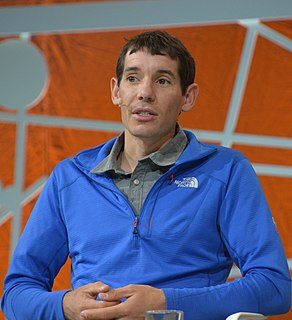Top 63 Quotes & Sayings by Alex Honnold
Explore popular quotes and sayings by an American athlete Alex Honnold.
Last updated on April 14, 2025.
I am a vegetarian, and I sort of aspire to vegan-hood. So far I've noticed no difference at all in my climbing, but I feel a bit healthier overall. Though that's only because I'm eating more fruits and vegetables. I think the whole protein thing is overhyped. Most Americans eat far more than we need.
Seven years ago, when I started free soloing long, hard routes in Yosemite - climbing without a rope, gear or a partner - I did it because it seemed like the purest, most elegant way to scale big walls. Climbing, especially soloing, felt like a grand adventure, but I never dreamed it could be a profession.
In a general sense, I think it's bad to bring too much money into climbing, since it takes away a little from the beauty of the mountains. But at the same time, I can't blame the Nepali government - or the Indian, Pakistani or Chinese, depending on where you're climbing - from wanting to capitalize on foreign climbers.
The thing with physical preparation is I have tons of friends who train at a really high level and who can give me advice. But with mental training, I don't really know anybody who has a much better mind for climbing, I guess, so I don't really know where I would go. It's not really a limiting factor for me.
Yosemite has the most impressive and accessible granite big walls in the world. The rock is amazing. And because of that, it's been the mecca for climbing in the U.S. - and the world to a large degree - for all of climbing history. It's the place to test yourself against the historic routes of the past.
If you're climbing big routes that'll take you 16 hours, or, like, El Capitan, you have to take something like a big, robust sandwich. Climbing isn't like running or triathlons, where you have to constantly be eating blocks, gels, and pure sugar. Climbing is relatively slow, so you can pretty much eat anything and digest it as you climb.






















